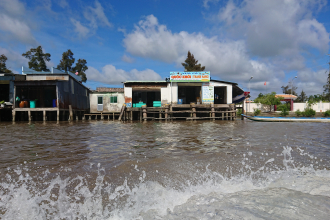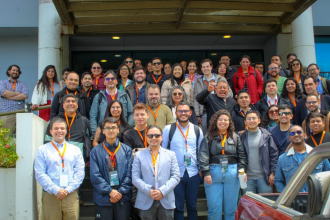Small-scale gold miners’ preferences on formalization: first steps toward sustainable supply chains in Colombia
Key Messages
- Artisanal and small-scale gold miners in remote areas of Colombia are willing to try formalization (obtaining a legal title to extract gold). However, they perceive costs can hinder the adoption of this formalization
- Bundles of preferences about benefits and costs of formalization are not uniform across commodities and depend upon previous experience with formalization and the strength of social capital formation.
- Gender seems to play an effect on preferences, but this impact is not consistent across the communities studied

Study suggests solutions to water pollution problems in Vietnam’s seafood industry
Vietnam's seafood industry, a cornerstone of the nation's economy, grapples with challenges like water pollution, low productivity, and inefficiency. A groundbreaking study by EfD Vietnam researchers…

Who is affected by carbon pricing and why? Evidence from 87 countries
We are honored to have Jan Steckel as our first speaker for the year. Jan is an accomplished researcher based at the Mercator Research Institute on Global Commons and Climate Change (MCC) where he…
Risk analysis as a tool for the prioritization of Secondary Environmental Quality Standards in the main tributary rivers to the fjord system of Northwestern Patagonia, under hydrological drought scenarios
This interdisciplinary study addresses the complex dynamics of anthropogenic climate change and hydrological processes in Northwest Patagonia, focusing on the tributary rivers integral to the region's

EfD Chilean team participated in the XIII Annual Meeting of the Chilean Society for Regional Studies (SOCHER)
The theme of the SOCHER 2023 meeting in the city of Valdivia in southern Chile was Territorial Challenges and Sustainability. Several EfD Chile fellow researchers, academics, and alumni from various…
Assessing the costs of ozone pollution in India for wheat producers, consumers, and government food welfare policies
We evaluate the impact of ozone pollution on wheat yields in India and its economic consequences for producers, consumers, and the government. Using an ozone flux–based risk assessment, we find that ambient ozone levels led to a 14.18% average reduction in wheat yields from 2008 to 2012. Irrigated wheat was particularly susceptible to ozone-induced losses, highlighting a potential threat to climate-change adaptation through irrigation expansion. Employing an economic model, we analyze the effects of a "pollution-free" scenario on various factors.
Pagination
- Previous page
- Page 19
- Next page
